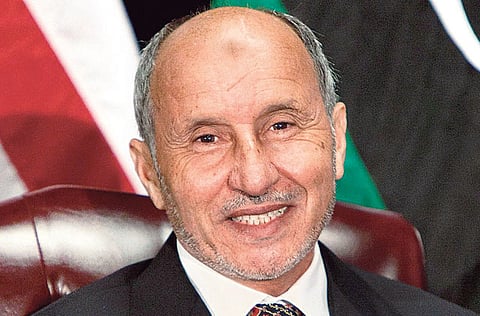Libya announces post-Gaddafi cabinet
Liberation to be declared after Sirte is captured

Dubai: Libya's transitional leaders named a new cabinet yesterday and said they would step down after the country is fully secured, putting an end to weeks of political infighting as the North African nation struggles to get back on its feet.
The head of the National Transitional Council (NTC), Mustafa Abdul Jalil, and de facto prime minister, Mahmoud Jibril, made the announcement in a joint news conference in the former revolutionary stronghold of Benghazi.
Revolutionary forces are still battling loyalists of ousted dictator Muammar Gaddafi on two major fronts as well as pockets deep in the southern desert. But Abdul Jalil said liberation will be declared after Gaddafi's hometown of Sirte is captured because that would ensure the borders are secure. He also promised to name a new transitional government within a month after liberation is declared.
"We have signed a pledge ... that we will not take part in any future government in any way," Abdul Jalil said.
The NTC has promised to hold elections eight months after the end of fighting. "We ask Libyans to understand that this is a sensitive and critical stage," he told reporters.
After weeks of wrangling, the new cabinet line-up did not contain many changes. Jibril remains in his position but also takes over as foreign minister, meaning his current deputy and foreign minister Ali Al Essawi is out. Ali Al Tarhouni, a US-educated economist, will continue acting as oil minister until the National Oil Company is ready to take over.
A new minister for Libyans killed and wounded was named. He is Abdul Rahman Al Keissah, described as a lawyer who was wounded in the fighting. Hamza Abu Fas will replace Shaikh Salem Al Shaiki as the minister of religious affairs.
Meanwhile, Niger said it will allow Libya's transitional government to interrogate Gaddafi's son Saadi, who fled to the neighbouring country after his father lost control of Tripoli and is wanted on suspicion of "armed intimidation."
Niger recognises the NTC as the only legitimate authority in Libya and its members can "come freely" to Niger, Justice Minister Marou Amadou said.
A Red Cross convoy trying to take medical supplies into Sirte had to turn back because revolutionaries opened fire on the town.
Sign up for the Daily Briefing
Get the latest news and updates straight to your inbox


